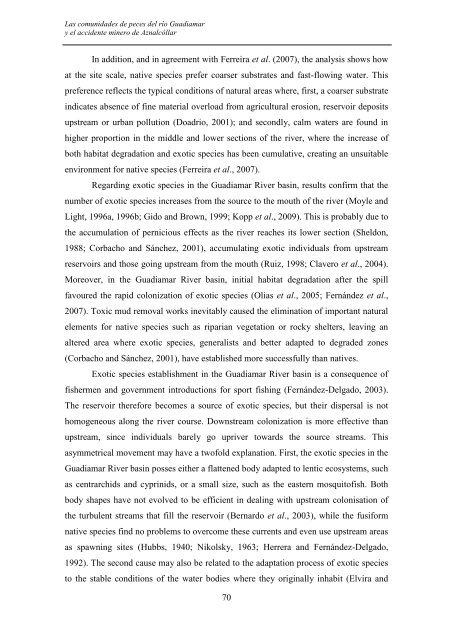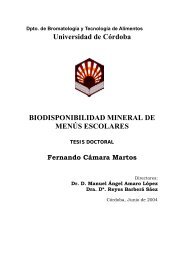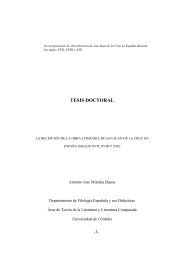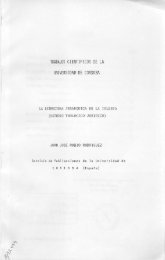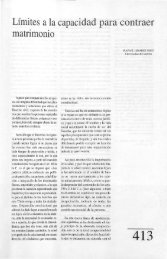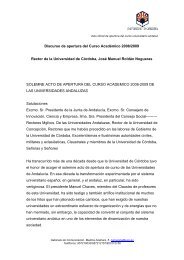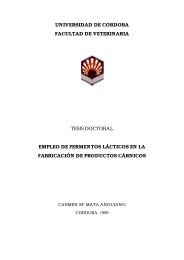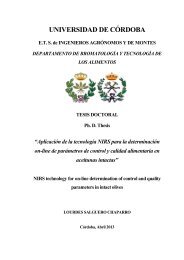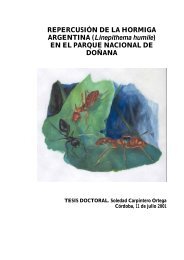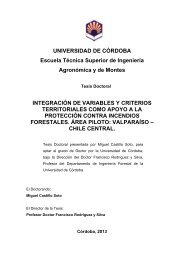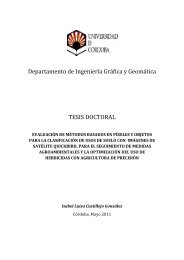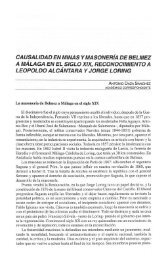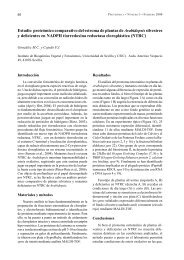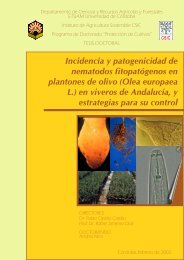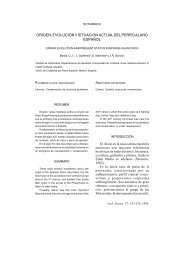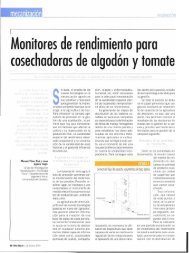las comunidades de peces del río guadiamar y el accidente minero ...
las comunidades de peces del río guadiamar y el accidente minero ...
las comunidades de peces del río guadiamar y el accidente minero ...
You also want an ePaper? Increase the reach of your titles
YUMPU automatically turns print PDFs into web optimized ePapers that Google loves.
Las <strong>comunida<strong>de</strong>s</strong> <strong>de</strong> <strong>peces</strong> <strong>de</strong>l <strong>río</strong> Guadiamar<br />
y <strong>el</strong> acci<strong>de</strong>nte <strong>minero</strong> <strong>de</strong> Aznalcóllar<br />
In addition, and in agreement with Ferreira et al. (2007), the analysis shows how<br />
at the site scale, native species prefer coarser substrates and fast-flowing water. This<br />
preference reflects the typical conditions of natural areas where, first, a coarser substrate<br />
indicates absence of fine material overload from agricultural erosion, reservoir <strong>de</strong>posits<br />
upstream or urban pollution (Doadrio, 2001); and secondly, calm waters are found in<br />
higher proportion in the middle and lower sections of the river, where the increase of<br />
both habitat <strong>de</strong>gradation and exotic species has been cumulative, creating an unsuitable<br />
environment for native species (Ferreira et al., 2007).<br />
Regarding exotic species in the Guadiamar River basin, results confirm that the<br />
number of exotic species increases from the source to the mouth of the river (Moyle and<br />
Light, 1996a, 1996b; Gido and Brown, 1999; Kopp et al., 2009). This is probably due to<br />
the accumulation of pernicious effects as the river reaches its lower section (Sh<strong>el</strong>don,<br />
1988; Corbacho and Sánchez, 2001), accumulating exotic individuals from upstream<br />
reservoirs and those going upstream from the mouth (Ruiz, 1998; Clavero et al., 2004).<br />
Moreover, in the Guadiamar River basin, initial habitat <strong>de</strong>gradation after the spill<br />
favoured the rapid colonization of exotic species (Olias et al., 2005; Fernán<strong>de</strong>z et al.,<br />
2007). Toxic mud removal works inevitably caused the <strong>el</strong>imination of important natural<br />
<strong>el</strong>ements for native species such as riparian vegetation or rocky sh<strong>el</strong>ters, leaving an<br />
altered area where exotic species, generalists and better adapted to <strong>de</strong>gra<strong>de</strong>d zones<br />
(Corbacho and Sánchez, 2001), have established more successfully than natives.<br />
Exotic species establishment in the Guadiamar River basin is a consequence of<br />
fishermen and government introductions for sport fishing (Fernán<strong>de</strong>z-D<strong>el</strong>gado, 2003).<br />
The reservoir therefore becomes a source of exotic species, but their dispersal is not<br />
homogeneous along the river course. Downstream colonization is more effective than<br />
upstream, since individuals bar<strong>el</strong>y go upriver towards the source streams. This<br />
asymmetrical movement may have a twofold explanation. First, the exotic species in the<br />
Guadiamar River basin posses either a flattened body adapted to lentic ecosystems, such<br />
as centrarchids and cyprinids, or a small size, such as the eastern mosquitofish. Both<br />
body shapes have not evolved to be efficient in <strong>de</strong>aling with upstream colonisation of<br />
the turbulent streams that fill the reservoir (Bernardo et al., 2003), while the fusiform<br />
native species find no problems to overcome these currents and even use upstream areas<br />
as spawning sites (Hubbs, 1940; Nikolsky, 1963; Herrera and Fernán<strong>de</strong>z-D<strong>el</strong>gado,<br />
1992). The second cause may also be r<strong>el</strong>ated to the adaptation process of exotic species<br />
to the stable conditions of the water bodies where they originally inhabit (Elvira and<br />
70


